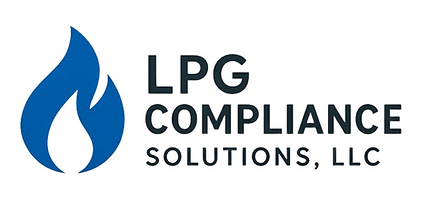Protecting Your Business, Your People, and the Public
Operating a propane terminal or bulk plant comes with significant responsibility, not only to your employees and customers, but also to your community and the environment. Two key federal regulatory programs directly impact your operations: the EPA’s Risk Management Plan (RMP) and OSHA’s Process Safety Management (PSM) standard.


EPA RMP & OSHA PSM for Wholesale Propane Terminals
Compliance with EPA's RMP and OSHA's PSM regulations is not just about avoiding fines, it’s about safeguarding your facility, your workforce, and your business reputation. These programs are designed to prevent catastrophic chemical accidents through proactive planning, documentation, and safety practices.
OSHA Process Safety Management (PSM)
OSHA’s PSM standard (29 CFR 1910.119) is triggered when your site holds 10,000 pounds or more of flammable gases, including propane.
You’re required to implement a detailed program that includes:
-
Process Hazard Analyses (PHAs)
-
Written Operating & Maintenance Procedures
-
Mechanical Integrity Programs
-
Employee Training & Participation
-
Management of Change (MOC) Processes
Neglecting PSM responsibilities can result in enforcement actions, shutdowns, and increased safety risks.
EPA Risk Management Plan (RMP)
The EPA’s RMP rule (40 CFR Part 68) applies to facilities storing 10,000 pounds or more of propane. The rule is designed to prevent and mitigate the consequences of accidental chemical releases.
Key requirements include:
-
Hazard Assessments & Offsite Consequence Analyses
-
Accident Prevention Programs
-
Emergency Response Coordination
-
Public Disclosure & Plan Submission to the EPA
Failure to maintain a compliant RMP can lead to costly penalties and increased scrutiny.
Is propane exempt from OSHA PSM and EPA RMP?
This is a common and potentially costly misconception.
No, propane is not categorically exempt from EPA RMP requirements.
However, two narrow exemptions may apply:
-
Fuel Use Exemption:
If the propane is used solely as a fuel (e.g., for heating or engine fuel on-site), it may qualify for exemption under 40 CFR 68.115(b)(2). -
Retail Exemption:
If the propane is held for sale to the public at a retail facility, and more than half of the propane is sold directly to end users (e.g., to consumers filling BBQ tanks or residential bottles), a retail exemption may apply.
Most wholesale propane terminals do not qualify for these exemptions and are subject to full RMP requirements.
Potential EPA Fines and Penalties
There are typically three types of enforcement cases: failure to submit a risk management plan; failure to implement a RMP; and cases in which there was an accident or release, where EPA cites failure to adequately implement a RMP and failure to comply with the Clean Air Act General Duty Clause. Civil penalties for violations of the RMP can now be assessed at a statutory maximum penalty of $121,275 per violation per day, making compliance incredibly important. In 2023, EPA entered into more than 80 RMP settlements, which frequently involve amounts in the six-figure range. Enforcement actions that make it to the courts have previously resulted in penalties in excess of $1 million alongside mandated requirements for vast facility improvements.
Compliance is Good Business
Beyond regulatory penalties, there are realworld business advantages to a strong safety and compliance culture:
-
Reduce the risk of major accidents and costly downtime
-
Improve relationships with regulators, insurers, and the public
-
Standardize safe work practices across your operations
-
Protect your business, reputation, and employees
We're Here to Help
We specialize in helping propane terminal owners build, audit, and maintain process safety programs that meet EPA RMP, OSHA PSM, and NFPA 58 standards.
RMP
RMP Development & Submission
PROCEDURES
Review, Revise or Develop Operating and Maintenance Procedures

PSM
PSM Program Creation & Audits
TRAINING
Onsite Operations Training and Compliance Coaching
FSA
Develop Site Specific Fire Safety Analysis (FSA)

GAP ASSESSMENT
Site Specific Evaluation and Assessment of Your Process/Terminal according to Applicable Regulatory Requirements



